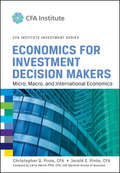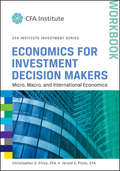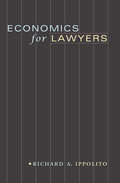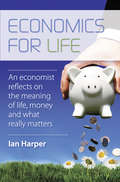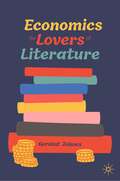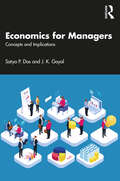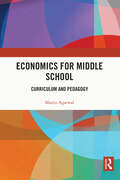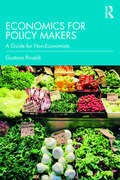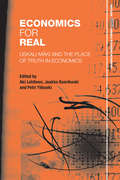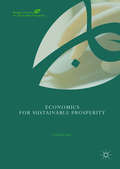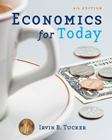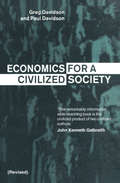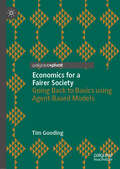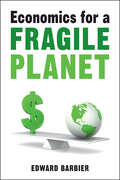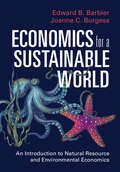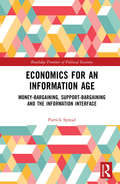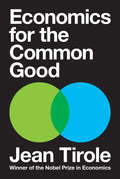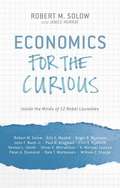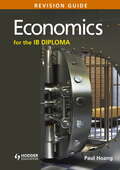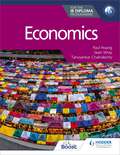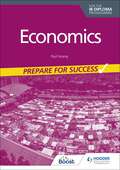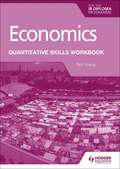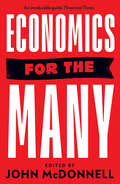- Table View
- List View
Economics for Investment Decision Makers
by Jerald E. Pinto Christopher D. Piros CFA Larry HarrisThe economics background investors need to interpret global economic news distilled to the essential elements: A tool of choice for investment decision-makers. Written by a distinguished academics and practitioners selected and guided by CFA Institute, the world's largest association of finance professionals, Economics for Investment Decision Makers is unique in presenting microeconomics and macroeconomics with relevance to investors and investment analysts constantly in mind. The selection of fundamental topics is comprehensive, while coverage of topics such as international trade, foreign exchange markets, and currency exchange rate forecasting reflects global perspectives of pressing investor importance. Concise, plain-English introduction useful to investors and investment analystsRelevant to security analysis, industry analysis, country analysis, portfolio management, and capital market strategyUnderstand economic news and what it meansAll concepts defined and simply explained, no prior background in economics assumedAbundant examples and illustrationsGlobal markets perspective
Economics for Investment Decision Makers Workbook: Micro, Macro, and International Economics
by Jerald E. Pinto Christopher D. Piros CFAThe economics background investors need to interpret global economic news distilled to the essential elements: A tool of choice for investment decision-makers. Written by a distinguished academics and practitioners selected and guided by CFA Institute, the world's largest association of finance professionals, Economics for Investment Decision Makers is unique in presenting microeconomics and macroeconomics with relevance to investors and investment analysts constantly in mind. The selection of fundamental topics is comprehensive, while coverage of topics such as international trade, foreign exchange markets, and currency exchange rate forecasting reflects global perspectives of pressing investor importance. Concise, plain-English introduction useful to investors and investment analysts Relevant to security analysis, industry analysis, country analysis, portfolio management, and capital market strategy Understand economic news and what it means All concepts defined and simply explained, no prior background in economics assumed Abundant examples and illustrations Global markets perspective
Economics for Lawyers
by Richard A. IppolitoWhether dealing with contracts, tort actions, or government regulations, lawyers are more likely to be successful if they are conversant in economics. Economics for Lawyers provides the essential tools to understand the economic basis of law. Through rigorous analysis illustrated with simple graphs and a wide range of legal examples, Richard Ippolito focuses on a few key concepts and shows how they play out in numerous applications. There are everyday problems: What is the social cost of legislation enforcing below-market prices, minimum wages, milk regulation, and noncompetitive pricing? Why are matinee movies cheaper than nighttime showings? And then there are broader questions: What is the patent system's role in the market for intellectual property rights? How does one think about externalities like airport noise? Is the free market, a regulated solution, or tort law the best way to deliver the "efficient amount of harm" in the workplace? What is the best approach to the question of economic compensation due to a person falsely imprisoned? Along the way, readers learn what economists mean when they talk about sorting, signaling, reputational assets, lemons markets, moral hazard, and adverse selection. They will learn a new vocabulary and a whole new way of thinking about the world they live in, and will be more productive in their professions.
Economics for Life: An economist reflects on the meaning of life, money and what really matters
by Ian HarperIn Economics For Life, Ian Harper shares insights gained from his professional career as an economist during an exciting period of world history. Dr Harper demonstrates why economics is a good servant but a bad master. While he suggests that 'It is surely good that millions of human beings have been delivered from grinding poverty by economic systems variously based on market principles,' he also observes that 'The creation and acquisition of wealth has become, for many people, the sole purpose of their existence and the sole criterion of value in their lives.' He shares not only what he has learned as one of Australia's best-known economists, but also something of the values which undergird his worldview.
Economics for Lovers of Literature
by Geraint JohnesThis book provides an engaging introduction to economics through a literary lens. Drawing on writers such as James Joyce, George Eliot, Edith Wharton, Jane Austen, Charlotte Bronte, and Elizabeth Gaskell, each chapter is framed around a quote from a classic text of English literature that helps tease out a key economic concept and demonstrate its broader relevance. While rigorous, the book is virtually free of technical language and aims to give a concise overview of all the main topics in contemporary economics – from supply and demand, pricing, labour markets, externalities, and game theory, to environmental and behavioural economics, fiscal policy and business cycles, modern approaches to macroeconomics and economic growth.Interweaving literary examples with easy-to-follow explanations and reflective tasks, the book takes an interdisciplinary approach to economics and literature that requires no prior knowledge in either camp, but which illuminates patterns of real-world behaviour observed by novelists and economists alike. This concise and accessible book will be a valuable tool for students embarking on introductory economics courses, economics modules in business studies, and interdisciplinary courses more broadly, as well as the general reader interested in building their knowledge of economics.
Economics for Managers: Concepts and Implications
by Satya P. Das J.K. GoyalThis book will sharpen the core decision-making skills of budding managers and entrepreneurs through the concepts, logic, and principles of microeconomics used in the book with suitable examples and cases from multiple industries from across the world. By placing strong emphasis on the fundamental theories, concepts, and their application in real-life business scenarios, the book presents chapters infused with relevant case-lets, snippets, and exercises. Written in simple and engaging conversational style, this book makes complex topics easily comprehensible to the readers who have virtually no background in economics.This book will be useful to students, researchers, and teachers from the field of economics, applied economics, and business studies. Additionally, this book would also be an invaluable companion to aspiring business managers and corporate leaders.
Economics for Middle School: Curriculum and Pedagogy
by Manju AgarwalThis book discusses the importance of teaching fundamental economic concepts as part of the middle school social science curriculum in India. It examines the status of economics in Indian schools, the issues faced in teaching it at the middle school level, and emphasizes the need for increasing the economic literacy of students. It offers valuable recommendations to curriculum planners and educators to help them bolster economics education in Indian schools. The author presents an extensive curriculum framework with the intention of developing intellectual and social skills in students. The book also features classroom tested lessons, content guidelines, and a comprehensive teaching plan for grades six, seven, and eight. A crucial contribution to the study of school education in India, this book will be of interest to teachers, students, and researchers of education, economics education, and economics. It will also be useful for policy planners, professional economists, administrators, school boards, and research institutions.
Economics for Policy Makers: A Guide for Non-Economists
by Gustavo RinaldiCertain key economic decisions taken by organizations and indeed countries are often not made by economists but by businessmen, trade unionists, politicians and policy-makers. Those who employ people, those who represent workers, those who make laws and those who elect them need economics but may have little time or desire to study it. This book makes economics easily available to everyone. The author’s use of simple language and avoidance of technical jargon provides non-economists with a better understanding of economic reasoning and the tools "to know and to decide". The author achieves this through introducing key concepts in short presentations and arming the reader with selected press articles and recent research using these concepts. An analysis of these demonstrates how a general concept can be derived from a specific context and highlighted questions provide the basis for further debate. The reader can then focus on the parts most relevant to their own needs. This book will have great appeal to employers, trade unionists and public officials attending courses organized by international institutions, professional training providers, as well as graduate students of courses where economics is an important element, especially in relation to its policy implications. Finally, it is invaluable for anybody who has wanted to learn the basics of practical economics but has been deterred by its technicalities.
Economics for Real: Uskali Mäki and the Place of Truth in Economics (Routledge Inem Advances In Economic Methodology Ser. #14)
by Aki Lehtinen Jaakko Kuorikoski Petri YlikoskiThis book provides the first comprehensive and critical examination of Mäki’s realist philosophy of economics.
Economics for Sustainable Prosperity (Binzagr Institute For Sustainable Prosperity Ser.)
by Steven HailThe central argument of this book is that the foundations for sustainable prosperity lie in an approach to economic management based on modern monetary theory and a job guarantee. This approach builds on the work of Keynes, Kalecki, Minsky, Davidson, Godley and other Post- Keynesian economists—as well as research by behavioral economists including Simon, Kahneman and Loewenstein—to explore the role that a permanent, equitable job guarantee could play in building an inclusive, participatory and just society. Orthodox (neoclassical) economics, in its various forms, has failed to deliver sustainable prosperity. An important reason for this failure is its lack of realistic foundations. It misrepresents both human nature and economic institutions, and its use as a frame for the development and assessment of economic policy proposals has had disastrous consequences for social inclusion and the quality of life of millions of people. This book discusses an alternative, more realistic and more useful set of economic foundations, which could deliver the opportunity of a decent quality of life with dignity to all.
Economics for Today (6th edition)
by Irvin B. TuckerPresents the basics of economic principles and the context to apply them to their everyday lives. The sixth edition continues Tucker's tradition of using a unique textual and visual learning system to concisely present and reinforce core concepts, then assess student comprehension.
Economics for a Civilized Society
by Paul Davidson Greg DavidsonThis collection includes translated works by Japanese women writers that deal with the experiences of modern women. The work of these women represents current feminist perception, imagination and thought.
Economics for a Fairer Society: Going Back to Basics using Agent-Based Models
by Tim GoodingThis Palgrave Pivot presents experiments that reveal core dynamics of trade in a complex system. Monetary trade is stripped of all its complications and placed in agent-based models, a complexity research tool capable of reproducing emergent behaviour and evolution. Included are ground-breaking repeatable experiments exploring the impact of evolutionary prerequisites empirically present in markets.Isolating the core dynamics of trade results in very simple agent-based models. However, decades of complexity research demonstrate that even the simplest systems result in emergent behaviour that is extremely difficult to anticipate. Readers who are only familiar with the linear-system theories and models used to train almost all undergraduate economics students might be surprised to witness price detaching from supply and demand, and extreme poverty and wealth arising in trade systems populated by agents with equal ability and opportunity. Watch as empirical evolutionary prerequisites are introduced and price patterns characterising two different markets – asset markets and speculative markets – emerge irrespective of supply and demand.In addition to laying the groundwork of monetary trade in a complex system, more complicated models feature mortal reproductive agents. Including ‘living’ populations in economic models reveal how the complexity characteristics of our market economy are impacting impoverishment and starvation.This book invites anyone interested in economics to join the growing ranks of people who are fascinated by the insights offered by complexity research.
Economics for a Fragile Planet: Rethinking Markets, Institutions and Governance
by Edward BarbierIn a world of growing environmental risks and ecological scarcities, ensuring a safe Anthropocene for humankind is essential. Managing an increasingly "fragile" planet requires new thinking on markets, institutions and governance built on five principles: ending the underpricing of nature, fostering collective action, accepting absolute limits, attaining sustainability, and promoting inclusivity. Rethinking economics and policies in this way can help to overcome the global challenges posed by climate change, biodiversity loss, freshwater scarcity, and deteriorating marine and coastal habitats. It requires decoupling wealth creation from environmental degradation through business, policy and financial actions aimed at better stewardship of the biosphere. In this book, renowned environmental economist Edward Barbier offers a blueprint for a greener and more inclusive economy, and outlines the steps we must take now to build a post-COVID world that limits environmental threats while sustaining per capita welfare.
Economics for a Sustainable World: An Introduction to Natural Resource and Environmental Economics
by Edward B. Barbier Joanne C. BurgessWritten for undergraduate students with little or no exposure to economics, this introductory textbook offers a new perspective on environmental economics for the 21st century. It explains how economics for a sustainable world requires a new approach: accepting that the economy is intrinsically dependent on nature. Drawing on up-to-date case studies from around the globe, the book examines how economic concepts and techniques can apply to a wide range of environmental challenges while ensuring that poor and vulnerable members of society are included in progress toward sustainable development. The book also addresses current environmental policy options and innovations at the local, regional, and international levels. Chapters cover key topics such as climate change, pollution, energy, minerals, forests, land use, oceans, biodiversity, and water scarcity. Included in the book are the following pedagogical features: learning objectives, boxed examples, discussion questions, lists of further resources, and a glossary.
Economics for an Information Age: Money-Bargaining, Support-Bargaining and the Information Interface (Routledge Frontiers of Political Economy)
by Patrick SpreadEconomics for an Information Age examines the central role of information within economics and society. The neoclassical economic model, taught as ‘mainstream economics’ in universities around the world, relies on a mathematical model of ‘resource allocation’ in which private advantage gives rise to public advantage in the shape of an optimal allocation of resources. However, this model assumes ‘perfect information’. In the present ‘information age’ such an assumption is even farther from the reality than it was in the past. People disseminate and manipulate information to further their interests. This book explains economic behaviour in terms of a theory of ‘money-bargaining’ and political and intellectual ‘support-bargaining’, in which the dissemination of information plays a central role. It uses this lens to explain how information is created, manipulated, disseminated, organised, understood, interpreted, used, bought and sold. This book will be of interest to mainstream and heterodox economists alike, as well as historians of economic thought, and anyone who seeks to better understand the impact of the information age on economic behaviour.
Economics for the Common Good
by Jean Tirole Steven RendallFrom Nobel Prize–winning economist Jean Tirole, a bold new agenda for the role of economics in societyWhen Jean Tirole won the 2014 Nobel Prize in Economics, he suddenly found himself being stopped in the street by complete strangers and asked to comment on issues of the day, no matter how distant from his own areas of research. His transformation from academic economist to public intellectual prompted him to reflect further on the role economists and their discipline play in society. The result is Economics for the Common Good, a passionate manifesto for a world in which economics, far from being a "dismal science," is a positive force for the common good.Economists are rewarded for writing technical papers in scholarly journals, not joining in public debates. But Tirole says we urgently need economists to engage with the many challenges facing society, helping to identify our key objectives and the tools needed to meet them.To show how economics can help us realize the common good, Tirole shares his insights on a broad array of questions affecting our everyday lives and the future of our society, including global warming, unemployment, the post-2008 global financial order, the euro crisis, the digital revolution, innovation, and the proper balance between the free market and regulation.Providing a rich account of how economics can benefit everyone, Economics for the Common Good sets a new agenda for the role of economics in society.
Economics for the Curious
by Robert M. Solow Janice Murray12 Nobel Laureates take readers on a tour of some of the everyday issues that can be explored using basic economic principles. Topics include how economic tools can be used to rebuild nations in the aftermath of a war; financing retirement as longevity increases and what governments should really be doing to boost the economy.
Economics for the IB Diploma Revision Guide: (International Baccalaureate Diploma)
by Paul HoangEconomics for the IB Diploma Revision Guide will ensure students can aim for their best grade with the help of accurate and accessible notes, examiner advice, and exam-style questions on each key topic. - Builds revision skills through a range of strategies and detailed examiner advice - Covers all the knowledge with concise, clear explanations of all the syllabus requirements and topics - Demonstrates what is required to get the best grades with tips, sample questions and model answers Answers are free online at www.hodderplus.com
Economics for the IB Diploma Revision Guide: (International Baccalaureate Diploma)
by Paul HoangEnsure students can aim for their best grade with the help of accurate and accessible notes, expert advice, and exam-style questions on each key topic.- Builds revision skills through a range of strategies and detailed expert advice- Covers all the knowledge with concise, clear explanations of all the syllabus requirements and topics- Demonstrates what is required to get the best grades with tips, sample questions and model answersAnswers are free online at www.hoddereducation.com/IBextras
Economics for the IB Diploma: (international Baccalaureate Diploma) (Skills For Success Ser.)
by Paul HoangDeveloped in cooperation with the International Baccalaureate®Ensure full coverage of the new syllabus with this comprehensive guide written by highly experienced authors, that explores all topics through inquiry, concepts, content and contexts and their interrelationships with each other.- Explore economics through the nine key concepts in the new course with our newly developed acronym for a deeper and more integrated understanding of the subject.- Includes new integrated subtopics of Economics of the environment and Economics of inequality and poverty which helps bring to light the global challenges facing the planet today and how these can be addressed using an Economics lens.- Apply new skills and knowledge to everyday life with examples and case studies.- Foster the attributes of the lB learner profile with explicit reference made throughout, as well as TOK links for every topic.- Prepare for the new assessment model with exam-style questions and review questions.- Avoid common mistakes and aim for the best grades with expert tips and hints.
Economics for the IB Diploma: (international Baccalaureate Diploma) (Skills For Success Ser.)
by Paul HoangDeveloped in cooperation with the International Baccalaureate®Ensure full coverage of the new syllabus with this comprehensive guide written by highly experienced authors, that explores all topics through inquiry, concepts, content and contexts and their interrelationships with each other.- Explore economics through the nine key concepts in the new course with our newly developed acronym for a deeper and more integrated understanding of the subject.- Includes new integrated subtopics of Economics of the environment and Economics of inequality and poverty which helps bring to light the global challenges facing the planet today and how these can be addressed using an Economics lens.- Apply new skills and knowledge to everyday life with examples and case studies.- Foster the attributes of the lB learner profile with explicit reference made throughout, as well as TOK links for every topic.- Prepare for the new assessment model with exam-style questions and review questions.- Avoid common mistakes and aim for the best grades with expert tips and hints.
Economics for the IB Diploma: Prepare for Success
by Paul HoangSupport your students to achieve their best grade with the ultimate course companion; providing clear and concise explanations of all new framework requirements and topics, with exam practice questions to strengthen and develop learning.- Build confidence and reinforce skills with guidance on how to include key concept, content and context connections into exam answers.- Practise and revise effectively from a range of strategies and a variety of high-achieving example answers.- Achieve the best grades through advice given from a highly experienced author on how to approach and explore a topic through inquiry, including additional top tips and common mistakes.- Focus revision by using key terms with definitions listed for each of the nine key concepts of the new course.- Answers are available to download for free: www.hoddereducation.co.uk/ib-extras
Economics for the IB Diploma: Quantitative Skills Workbook
by Paul HoangReinforce and improve your students' quantitative skills with this write-in workbook, which includes exam-style practice questions. · Prepare for the new assessment model with exam-style questions that are broken down to help students understand the question as a whole and the way they will need to tackle it.· Questions are presented in the chronological order of the syllabus, to aid knowledge and understanding of the new course (first exams 2022).· Provides lots of opportunities to practice quantitative skills, techniques and methods with exam-style questions.· Detailed mark schemes are provided to support students' assessment success, from a highly experienced author, IB workshop leader and teacher.· Answers available to download for free: www.hoddereducation.co.uk/ib-extras
Economics for the Many
by John McDonnellOur economy is rigged in favour of a wealthy elite. We need a new approach: an economics for the many.Big challenges lie ahead for our society: the rise of automation and the threat of catastrophic climate change. But so, too, do the huge possibilities presented by new technology and better ways of organising our economy in the wake of neoliberalism’s failure. With the election of Jeremy Corbyn as Labour leader, and the extraordinary turnaround in Labour’s fortunes in the 2017 election, we have a real opportunity to build an economy in Britain that is radically fairer, radically more democratic, and radically more sustainable. But we need the right ideas and strategies if we’re going to get there.Economics for the Many, edited and with an introduction by Shadow Chancellor of the Exchequer John McDonnell, features contributions from the participants in his New Economics conferences, including Barry Gardiner, Ann Pettifor, Prem Sikka, and Guy Standing. It covers topics from housing, public ownership, and fairer international trading systems to industrial policy for the twenty-first century and how to tackle tax avoidance and regional imbalances. Together, the essays in this volume lay out a vision for a new economics, one that works for the many, not the few.
